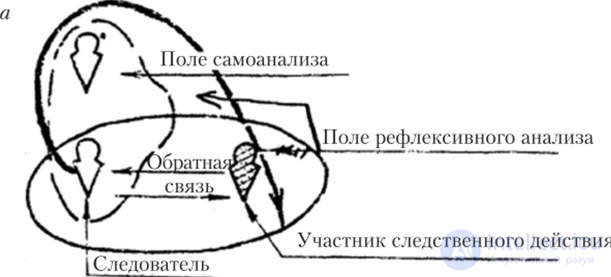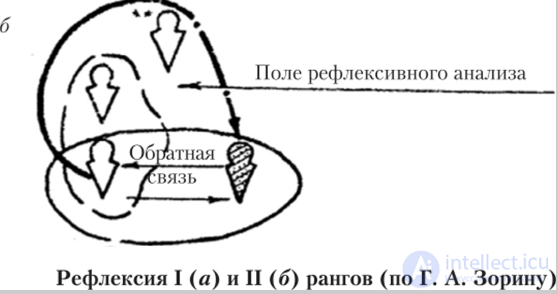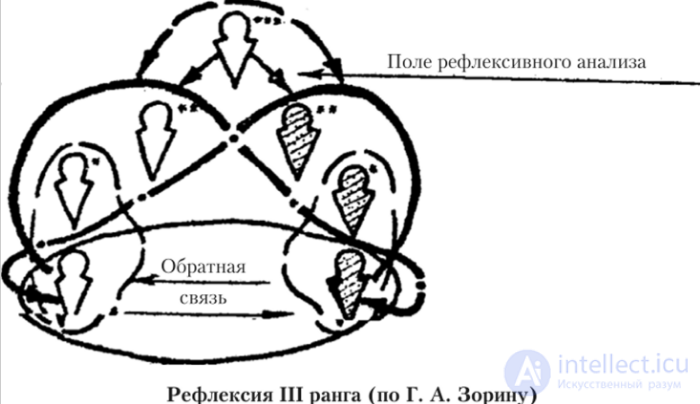Lecture
Reflection (from the Latin. Reflecsio - "call back") - a concept denoting the display, as well as the study of cognitive action. In a variety of philosophical systems, it had a diverse content. J. Locke considered reflexion to be the key of special knowledge when observation rushes to the internal acts of consciousness, while sensation has external objects as its object. For K. Leibniz, reflection is nothing but an interest in what happens in us. According to D. Hume, ideas are reflections on impressions acquired from outside.
For G. Hegel, reflection is a mutual image of one in the other, for example, in the essence of a phenomenon. The term “reflect” means “to concentrate the consciousness on itself, to think over your mental state”.
The main components of the reflective ability, peculiar only to man:
1) self-observation - observation focused on itself;
2) self-esteem - understanding of oneself, one’s own physical and intellectual potentials, goals and motives of behavior, attitude towards people and the surrounding reality;
3) self-identity as a member of society, the team. An important element is self-knowledge. Many scientists compare reflection with self-awareness, but most researchers draw a parallel with self-knowledge.
The leading role in the study of the reflexive ability of a person and its components is assigned to S. L. Rubinstein, K. K. Platonov, I. S. Konu, and their followers. A great contribution to the study of reflection was made by other ancient and modern philosophers and psychologists.
Understanding himself as a personal evolution, a person involuntarily comes to understand the need for self-education and self-control. Some of his qualities are unacceptable for him and for society. As a result, for a healthy life, you need an awareness of self-development and correction of certain personality traits.
At the beginning of ontogenesis, consciousness is focused on the outside world. Such a consciousness can already be described as reflexive. According to V. P. Zinchen-ko, it contains:
1) meaning is the aggregate of subject-verbal meanings and representations studied in the past experience that constitute the content of the collective consciousness;
2) the meaning is the subjective-personal awareness of what is happening: life circumstances and information coming from outside. In the process of upbringing and education, each person independently adopts certain meanings and concepts, therefore, he puts his meaning into the ongoing phenomena of personal and social life.
Reflection - the comprehension of the personal "I". Therefore, its main function is reflexive, which characterizes the essence of consciousness. Since personality traits are detected through communication and behavior, a person compares his outward manifestations while observing the reaction of those present, correcting personal manifestations and self-esteem.
Developing surprise, a person draws attention to himself. Reflection is most often understood as self-awareness, the reversal of consciousness on oneself. According to the definition of the British philosopher John Locke (1632–1704), this is “the observation to which the mind exposes its activity and the ways of its manifestation” (“The Experience of Human Understanding”, 1690). Luc de Clapier Woveparg (1715-1747) defined reflection as “a gift that allows us to focus on our ideas, evaluate them, modify them and combine them in different ways” (Introduction to the Knowledge of the Human Mind, 1746).
Many philosophers recommended the implementation of reflection procedures that look like accounting statements. Classical yoga requires monitoring your behavior, asking yourself every day: “What do I have in common with livestock? What - with virtuous? ”“ Golden Pythagorean verses ”give the following advice on the evening“ search of consciousness ”:
First, think over all matters, so as not to be bad.
You should not plunge into a restful dream,
Before you remember every today's business again:
What is wrong? What could you do? And what did ns do?
Go through everything in the mind, starting from the beginning and after.
Rejoice in good deeds and rebuke yourself for evil.
So do and learn what you should strive for
So you will find ways to achieve divine qualities.
Translation I. Yu. Peter
The extension of the idea of reflection was associated with the metaphysics of light and the interpretation of knowledge as the "natural" or "divine" light of the mind. The German philosopher Georg Wilhelm Friedrich Hegel (1770–1831) wrote: “We use the expression reflection primarily in relation to light when it encounters a mirror surface in its rectilinear motion and is thrown back by it. Thus, we have here something doubled: firstly, some immediate, some existing and, secondly, the same as mediated, or posited. But the same thing happens when we reflect on an object, or (as they usually say) reflect on it, because it is here that the object is not recognized by us in its immediacy, we want to know it as mediated. Reflection acts as mediated, not direct knowledge ” [1] .
Reflection is mediated by others, because you can look at yourself only from the side, i.e. being different. Such a method is also possible: “As if we want to see our face, we look in the mirror and see it, so if we want to know ourselves, we can know ourselves by looking at a friend” [2] . Therefore, Hegel suggested: “Get out of yourself and reveal yourself to yourself in another, find and know yourself in everything through yourself” [3] .
Reflection as self-reflection is characterized by:
Reflection in the investigative situation of interrogation [4] consists of the following elements: 1) the investigator, as he really is; 2) the investigator, as he sees himself; 3) the investigator, as he appears to the interrogated; 4) the investigator, as he sees himself through the eyes of the interrogated; 5) the interrogated, as he really is; 6) the interrogated, as he sees himself; 7) the interrogated person as he appears to the investigator; 8) the interrogated, how he sees himself through the eyes of the investigator. 

The depth of reflection is characterized by rank.
Reflection of the first rank is, firstly, the reflection by the investigator of himself. Secondly, the investigator “plunges” into his partner, takes his position, tries on his mask, tries to test his emotional state, and then, taking all this into account, looks at himself (the investigator) and the situation. When a person is convinced that the investigator will not be able to prove his guilt, he is self-confident. When an investigator convicted a suspect of a crime, he considers the prospect of life only in a pessimistic aspect, etc. This also determines the increased resistance in the production of investigative actions. The possibility of loss of freedom, position in society, as a rule, mobilizes the suspect for active opposition to the investigator.
Reflection of the second rank is a reflection of the situation from the point of view of the prosecutor and the lawyer. Reflection of the third rank - from the point of view of the judge, which determines the judicial perspective of the case.
The German philosopher Gottfried Wilhelm Leibniz (1646-1716) pointed out one of the difficulties of reflection: “It is impossible for us to constantly and explicitly reflect on all our thoughts, otherwise our mind would reflect on each reflection to infinity, never being able to go over to some new thought ” [5] .

This difficulty was described by the Danish philosopher Paul Martin Möller (1794-1838) in his novel The Adventures of Danish Studiosus, where the protagonist complains: “My endless reflection makes me unable to achieve anything in life. In addition, I begin to think about my thoughts related to the situations in which I fall. I’m even thinking about what I’m thinking about all this, dividing myself in the end into a sequence of different “I” that goes to infinity, constantly watching each other. I cannot stop at any of them, and even if at some point I do this, a new “I” arises immediately and does the same. As a result, I just get confused and fall into confusion, as if looking into a bottomless abyss, and all my mental efforts lead only to a terrible migraine ” [6] .
The way out of this difficulty was proposed by the German mystic John Eckhart (1260-1327): "Find everything in yourself and yourself in everything." The potential infinity of internal reflection is opened by external reflection when knowing oneself is permitted by knowing another.
Comments
To leave a comment
History of psychology
Terms: History of psychology